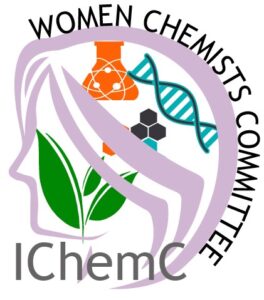Introduction
WCC, is a collection of great women Chemists in Sri Lanka under the unique and strong umbrella of chemistry institute in the country, the Institute of Chemistry Ceylon (IChemC).
Prof. P A Paranagama (Chairperson)
Prof. T Gobika (Secretary)
Prof. J A Liyanage
Prof. H M K K Pathirana
Prof. H I C de Silva
Dr. D T Abeysinghe
Prof. S Iqbal
Dr. D N Udukala
Prof. S Wickramarachchi
Dr. A G M J Gunaratna
Ms. N S Rajapakse
GWB 2025
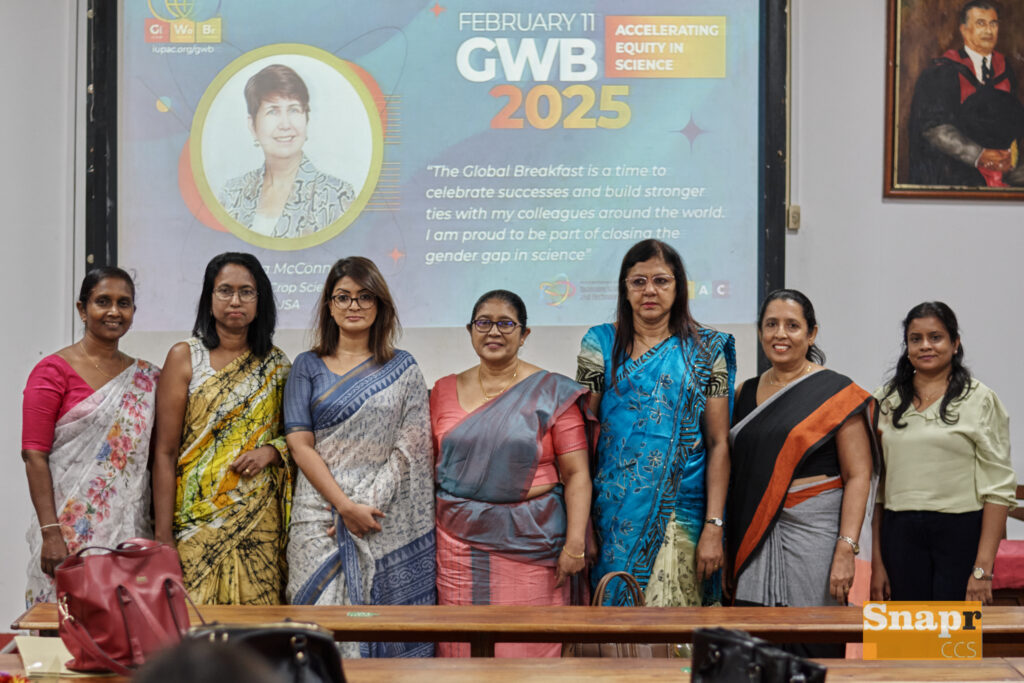
The Institute of Chemistry Ceylon successfully hosted the Global Women’s Breakfast 2025 on February 11, 2025, at the Adamantane House Auditorium in Rajagiriya. Organized in collaboration with the International Union of Pure and Applied Chemistry (IUPAC) Women Chemists Committee, the event took place under the theme “Accelerating Equity in Science.” This global initiative, celebrated simultaneously in several countries, aims to empower women in science and promote gender equity in scientific fields.
The Women Chemists Committee (WCC) of the Institute of Chemistry Ceylon was initially established in 2019 under the leadership of the then-president of the Institute. The current chairperson of the Women Chemist Committee and past president of the Institute of Chemistry Ceylon, Professor Priyani Paranagama from the University of Kelaniya, played a significant role in its initiation.
The current president of the Institute of Chemistry Ceylon, Professor Janitha Liyanage, in her address, she emphasized the significant role women have made in various occupations and sectors, highlighting their unwavering dedication and success. Ms. Chathini Uduwana Country Head and Vice President of Typefi Systems Sri Lanka Chapter Ambassador for Women in Tech and Dr. Indira Kahawita Consultant Dermatologist from the National Hospital Colombo were the distinguished guest speakers of the event. Ms. Chathini Uduwana delivered an inspiring speech encouraging women to pursue their goals while living in a supportive environment that enhances their dignity and value. Dr. Indira Kahawita, Consultant Dermatologist at the National Hospital of Colombo, focused on the importance of maintaining natural beauty and overall well-being without reliance on artificial cosmetics. She underscored the significance of women’s health and self-care while balancing professional and personal responsibilities.
The event featured a Photographic Abstract Competition and an Essay Competition organized by WCC. Ms. K. D. Chrishmika Shivanthini from the Institute of Chemistry Ceylon won 1st place, while the second place was won by Ms. T. Dananji Nayanahari and Ms. P. L. Chamini Madushika from the University of Colombo for the Photographic Abstract Competition. Ms. K.A.K.A. Kumarapeli from the University of Ruhuna won 1st place, Ms. K.T.G.A. Haripriya from the University of Sri Jayewardenepura won 2nd place, and Ms. D.M.A.T. Doranegoda from the University of Kelaniya won 3rd place for the Essay Competition. The winners had the opportunity to present their work, showcasing their talents and perspectives on women’s contributions to science and society.
The event concluded on a high note with a traditional Sri Lankan breakfast, among participants. The Global Women’s Breakfast 2025 stood as a testament to the strength, resilience, and potential of women in science, reinforcing the global commitment to equity and inclusion in the scientific community.
GWB 2024
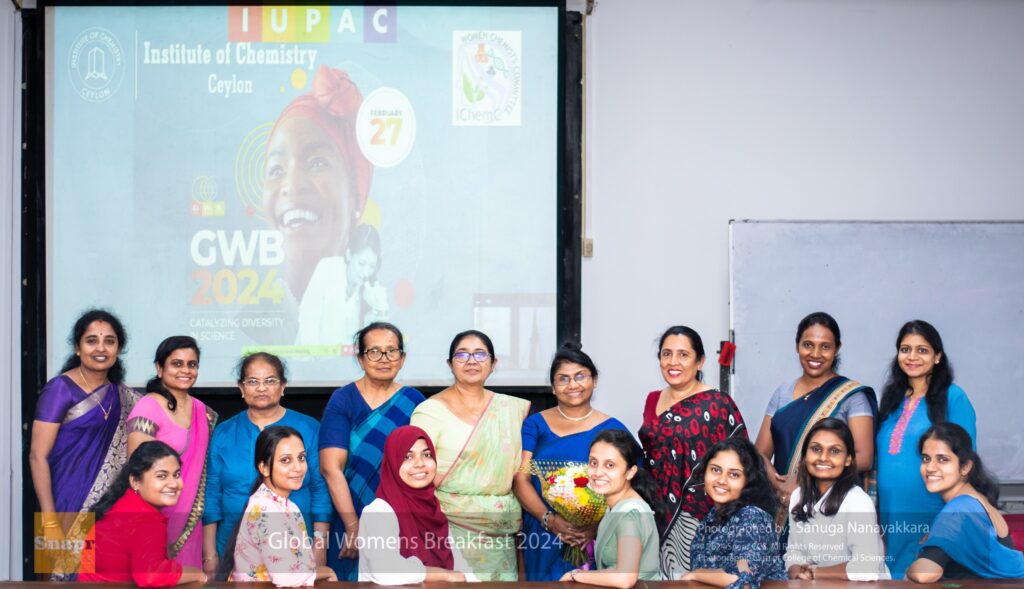
For the fourth consecutive year, the Women Chemists Committee (WCC) of the Institute of Chemistry Ceylon organized “The Sri Lankan Women Chemists Breakfast Event” to coincide with the IUPAC Global Women Breakfast. The event was held on 27th February 2024 from 9.00 am onwards at the Adamantane House, Institute of Chemistry Ceylon. This year, the event was themed “Catalyzing Diversity in Science” and aimed to promote inclusivity and representation of women in the field of chemistry. The event commenced with a welcome address by Prof. Namal Priyantha, President of the Institute of Chemistry Ceylon, followed by an introduction by Prof. Priyani Paranagama, Chairperson of the Women Chemists Committee and Chair of Chemistry at the University of Kelaniya. Guest speeches were delivered by Dr. Kala Peiris, Director of the Sri Lanka Center for Development Facilitation Development Consultant, and Prof. Manawadevi Ganehenage, Head of the Department of Chemistry at the University of Peradeniya. The event also included presentations from the finalists of the 'Photographic Abstract Competition' and the Inter-university competition on 'Nurturing Work-Life Balance.' Winners of the competitions were announced, followed by a vote of thanks by Dr. Gobika Thiripuranathar, Secretary of the Women Chemists Committee. The event concluded with a breakfast session, during which attendees had the opportunity to engage in discussions, network, and share experiences to further advance diversity and gender equality in the scientific community.
Essay Competition on ‘Role of Chemists in Green and Sustainable Industries’
Organized by the Women Chemist Committee (WCC) of the Institute of Chemistry Ceylon
Deadline: extended to 15th January 2025
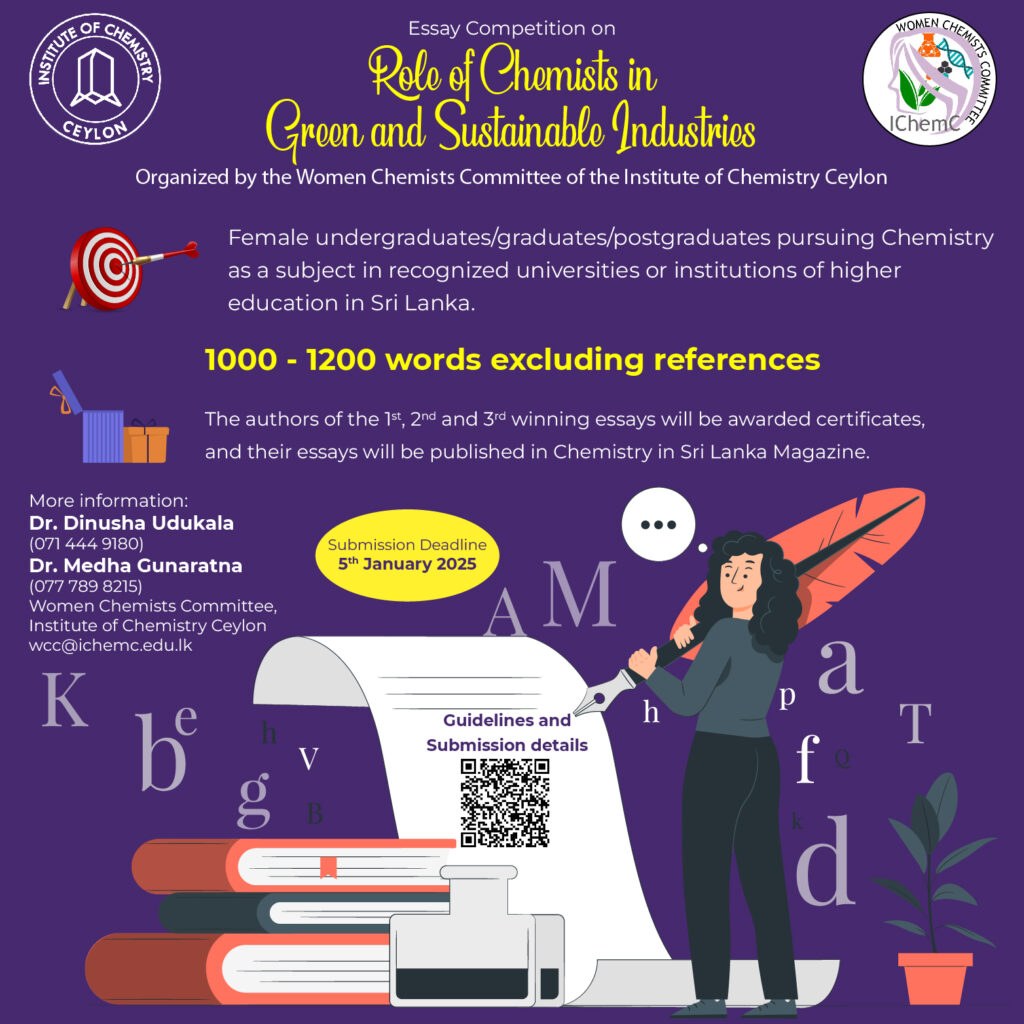
This essay competition aims to provide a dedicated platform for young and ambitious women chemists to share their perspectives on promoting diversity in the field of science.
Eligible participants: Female undergraduate/graduates/post-graduate students pursuing Chemistry as a major or a minor discipline from a Sri Lankan university or an institution of higher education in Sri Lanka.
Guidelines:
Each participant may submit only one essay.
Length of Essay: 1000 - 1200 words excluding references
Format Requirement:
- The essay should be typed and submitted in Microsoft Word and PDF format
- Page size: A4
- Font size and style: 12, Times New Roman
- Interline spacing: 1.5
- Margins: 1.5 inches left; 1 inch right; 1 inch top; 1 inch bottom
- Language: English
List of references shall also be submitted along with the essay submission.
Only original essays will be considered for the competition. Students are encouraged to write their essays in their own words, avoiding similarity to other’s work. The maximum percentage of plagiarism allowed shall be less than 20%, excluding references.
Deadline: extended to 15th January 2025
Submission details:
The essay submission along with the endorsement from the Head of the Department should be submitted through the following google form:
https://forms.gle/iMZC5k9oonXfdKrs5
Rewards:
The authors of the 1st, 2nd and 3rd winning essays will be awarded certificates, and their essays will be published in Chemistry in Sri Lanka Magazine.
More information:
Dr. Dinusha Udukala/ Dr. Medha Gunaratna
Women Chemists Committee, IChemC
Email: wcc@ichemc.edu.lk
Mobile: 0714449180 / 0777898215
In an attempt to broaden the modes of sharing and disseminating scientific knowledge, the Women Chemist Committee of the Institute of Chemistry Ceylon has established a platform to present your novel research findings with the aid of a photographic abstract. This virtual competition is organized with the aim of providing an opportunity for ambitious science scholars to showcase their research findings in an innovative way.
Target group: FEMALE - Undergraduate/postgraduate students/ research assistants pursuing research in academia and industry are highly encouraged to participate.
Submission Deadline: Extended to 31st December 2024
Photographic Abstract Competition Guidelines
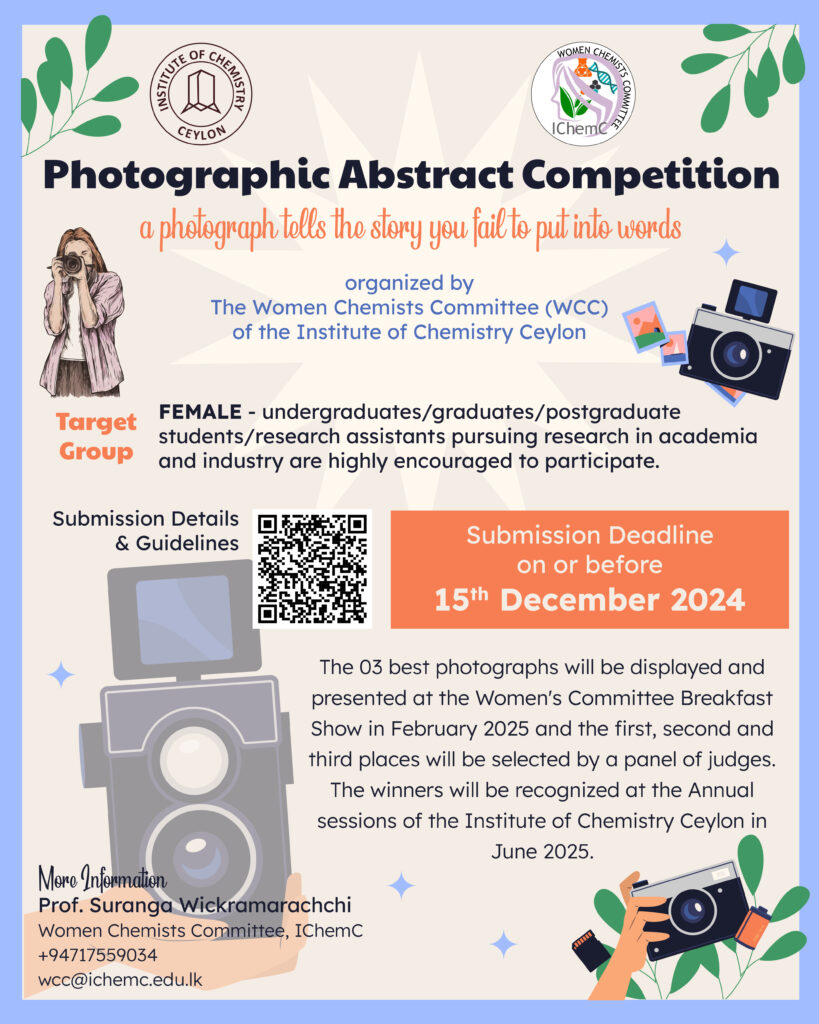

The Second International Conference on “Frontiers in Chemical Technology 2024 (FCT-2024),” organized by the Institute of Chemistry Ceylon, was successfully held from June 20th to 22nd at the Marino Beach Hotel, Colombo. FCT-2024 focused on technological advancements in chemical technology, covering key areas such as energy, food, environment, medicine, and waste management.
A highlight of the final day was a panel discussion on "Fostering Equality and Excellence: A Discussion on Women Empowerment in Chemistry," organized by the Women Chemists Committee (WCC) of the Institute of Chemistry Ceylon. The panel was moderated by Prof. Priyani A. Paranagama, Chairperson of the WCC and Treasurer of FCT-2024. This session brought together a distinguished group of global experts who shared insights on the empowerment of women in chemistry.
Prof. Supawan Tantayanon, from the Faculty of Science at Chulalongkorn University, spoke about her two-decade-long efforts to promote "small-scale chemistry," a practice aimed at minimizing the use of hazardous chemicals in undergraduate education. She emphasized the importance of incorporating small-scale chemistry into university curricula to foster safe and sustainable learning environments for young chemists.
Prof. Zuriati Zakaria, a retired professor from the Malaysian Institute of Chemistry, shared her experiences advocating for the empowerment of women in Asian countries. She provided valuable insights into the challenges and triumphs faced by women chemists across the region.
Dr. Ale Palermo, Head of Global Inclusion at the Royal Society of Chemistry and the Chief Guest at FCT-2024, shared her remarkable journey from an Assistant Professor in Argentina to becoming a Royal Society Visiting Fellow at Cambridge University. Dr. Palermo highlighted her extensive work in fostering a more inclusive global chemistry culture, spanning international programs in Africa and the Commonwealth. She has worked closely with chemical societies worldwide to promote diversity and inclusion. Notably, Dr. Palermo initiated the RSC Bullying and Harassment support line and developed career grants for chemists with caring responsibilities and disabilities. She also pioneered programs such as Broadening Horizons and the Windsor Fellowship to support chemistry students from minoritized racial and ethnic backgrounds. Dr. Palermo’s recent initiatives focus on socio-economic inclusion and collaboration with the UK government and US partners to address the attrition and retention of LGBT+ individuals in STEM fields.
Dr. Thelma Abeysinghe, Senior Lecturer at the Department of Chemistry, The Open University of Sri Lanka, discussed the unique challenges faced by women in STEM, especially in balancing professional responsibilities with roles as daughters, mothers, and wives. Her personal stories of overcoming these challenges resonated with the audience, as she highlighted the importance of perseverance and role models in the field of chemistry, both in Sri Lanka and internationally.
The discussion progressed to address the necessary changes in STEM fields that would allow women to thrive. Dr. Palermo emphasized the importance of broadening opportunities for women, particularly in chemistry, to create a more inclusive and equitable professional environment.
The panel concluded on an optimistic note, with a collective acknowledgement that further dialogue and action are needed to address the systemic issues facing women in chemistry and STEM fields more broadly. The session underscored the importance of continuous efforts to create fair and supportive spaces for women to excel in their scientific careers.

